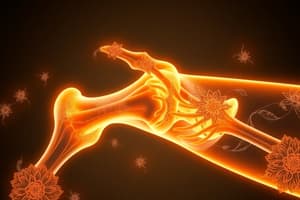Podcast
Questions and Answers
What is the primary structure involved in lateral humeral epicondylitis?
What is the primary structure involved in lateral humeral epicondylitis?
- Tendon of the extensor carpi radialis brevis (correct)
- Tendon of the extensor carpi ulnaris
- Tendon of the extensor communis
- Tendon of the extensor carpi radialis longus
Which of the following is a common initial symptom of lateral epicondylitis?
Which of the following is a common initial symptom of lateral epicondylitis?
- Pain and tenderness over the lateral epicondyle (correct)
- Numbness in the fingers
- Swelling of the elbow joint
- Pain over the medial epicondyle
What percentage of adult tennis players might experience humeral epicondylitis?
What percentage of adult tennis players might experience humeral epicondylitis?
- 10% to 20%
- 55% to 70%
- 35% to 50% (correct)
- 25% to 30%
What is associated with the degenerative condition of humeral epicondylitis?
What is associated with the degenerative condition of humeral epicondylitis?
Which activity is often attributed to the occurrence of humeral epicondylitis?
Which activity is often attributed to the occurrence of humeral epicondylitis?
What movement is likely to aggravate symptoms associated with tennis elbow?
What movement is likely to aggravate symptoms associated with tennis elbow?
What diagnostic tool is typically used for assessing tennis elbow?
What diagnostic tool is typically used for assessing tennis elbow?
Which symptoms may indicate the need to consider radial tunnel syndrome?
Which symptoms may indicate the need to consider radial tunnel syndrome?
What is the first step in the nonoperative management of tennis elbow?
What is the first step in the nonoperative management of tennis elbow?
Which of the following activities is commonly limited by tennis elbow?
Which of the following activities is commonly limited by tennis elbow?
What role does a tennis elbow clasp play in treatment?
What role does a tennis elbow clasp play in treatment?
What technique is suggested for managing edema and swelling?
What technique is suggested for managing edema and swelling?
Which of the following is a common sign of tennis elbow?
Which of the following is a common sign of tennis elbow?
What position should the patient assume when performing isometric contractions for wrist extensors?
What position should the patient assume when performing isometric contractions for wrist extensors?
What is a recommended approach to manage tennis elbow during the protection phase?
What is a recommended approach to manage tennis elbow during the protection phase?
Which of the following techniques is NOT mentioned for increasing muscle flexibility and scar mobility?
Which of the following techniques is NOT mentioned for increasing muscle flexibility and scar mobility?
What is the recommended initial resistance during wrist extension isometric exercises?
What is the recommended initial resistance during wrist extension isometric exercises?
What should a patient do to maintain integrity of the upper extremity during rehabilitation?
What should a patient do to maintain integrity of the upper extremity during rehabilitation?
What type of massage technique should be applied at the site of a lesion during therapy?
What type of massage technique should be applied at the site of a lesion during therapy?
During the mobilization with movement (MWM) technique for lateral epicondylitis, what is applied to the proximal forearm?
During the mobilization with movement (MWM) technique for lateral epicondylitis, what is applied to the proximal forearm?
Which of the following is emphasized as a technique to restore joint tracking of the RU joint?
Which of the following is emphasized as a technique to restore joint tracking of the RU joint?
Flashcards are hidden until you start studying
Study Notes
Lateral Epicondylitis
- Lateral epicondylitis is a common repetitive overuse injury of the elbow, affecting 35% to 50% of adult tennis players.
- It is characterized by pain and tenderness over the lateral epicondyle, often aggravated by activities involving forceful gripping and wrist extension.
- The primary structure involved is the tendon of the extensor carpi radialis brevis, with involvement of other extensor tendons in some cases.
- The condition is often associated with hypervascularization of the extensor aponeurosis and an increased quantity of free nerve endings in the subtendinous space.
- It is a degenerative condition involving vascular, chemical, and cellular events that lead to a failure of the cell-matrix healing response in tendons.
Diagnosis and Treatment
- X-rays are usually normal, but calcification may be visible in cases with longstanding symptoms
- Painful radial nerve entrapment should be considered in patients with persistent symptoms not responding to treatment.
- Doppler sonography may be utilized for diagnosis.
- Most lateral epicondylitis resolves spontaneously within 6–12 months.
- Treatment involves identifying and restricting activities that cause pain, including modification of sporting techniques.
- A tennis elbow clasp can be helpful, and corticosteroid injections may provide temporary pain relief but are not curative.
Common Impairments and Functional Limitations
- Gradually increasing pain in the elbow region after excessive activity of the wrist and hand.
- Pain when the involved muscle is stretched or contracts against resistance.
- Decreased muscle strength and endurance.
- Decreased grip strength limited by pain.
- Tenderness with palpation at the site of inflammation.
- Inability to participate in provoking activities such as racket sports, throwing, or golf.
- Difficulty with repetitive forearm/wrist tasks, such as typing or using a mouse.
Nonoperative Management: Protection Phase
- Immobilization of the wrist in a cock-up splint.
- Avoidance of aggravating activities.
- Cryotherapy to control edema and swelling.
Develop Soft Tissue and Joint Mobility:
- Multiple-angle muscle setting (low-intensity isometrics).
- Cross-fiber massage within tolerance.
Maintain Upper Extremity Function:
- Active range of motion exercises for joints not immobilized.
- Resistive exercises for shoulder and scapular range of motion.
Controlled Motion and Return to Function Phases:
- Manual and self-stretching techniques.
- Cross-fiber (friction) massage.
- Mobilization with movement (MWM) techniques.
- Progressive isometric exercises.
- Strengthening exercises for wrist extensors, gradually increasing resistance.
- Functional exercises, progressively incorporating provoking activities.
- Return to sports and work with a focus on proper technique and gradual loading.
Studying That Suits You
Use AI to generate personalized quizzes and flashcards to suit your learning preferences.




